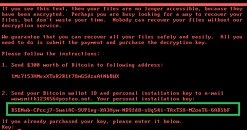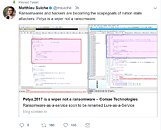34 Companies Sign the Cybersecurity Tech Accord
34 different companies (which include Microsoft, Facebook, Cisco, Nokia, and Oracle) signed the Cybesecurity Tech Accord this week. The Accord, which is being hailed as the "Digital Geneva Accord", ratifies a new era of corporations' protection of customers, and a new way to engage and protect from cyberattacks. The biggest part of this? The pledge not to aid governments in performing any type of cyberattacks against customers. The usage of the word customers isn't an innocent one: a consumer is such in any part of the world, regardless of any given countries' definition.
The idea behind the Accord is to allow "public commitment among 34 global companies to protect and empower civilians online and to improve the security, stability and resilience of cyberspace." This is an effort from tech companies to distance themselves from all manner of centralized government power, and to place themselves in a new, customer-protective light. At the same time, companies are looking to engender a coordinated response to global-scale ransomware attacks, such as last years' WannaCry and NotPetya events. "The devastating attacks from the past year demonstrate that cybersecurity is not just about what any single company can do but also about what we can all do together." said Microsoft President Brad Smith. "This tech sector accord will help us take a principled path towards more effective steps to work together and defend customers around the world." You can read the entire post on the mission and signing of the Accord after the break.
The idea behind the Accord is to allow "public commitment among 34 global companies to protect and empower civilians online and to improve the security, stability and resilience of cyberspace." This is an effort from tech companies to distance themselves from all manner of centralized government power, and to place themselves in a new, customer-protective light. At the same time, companies are looking to engender a coordinated response to global-scale ransomware attacks, such as last years' WannaCry and NotPetya events. "The devastating attacks from the past year demonstrate that cybersecurity is not just about what any single company can do but also about what we can all do together." said Microsoft President Brad Smith. "This tech sector accord will help us take a principled path towards more effective steps to work together and defend customers around the world." You can read the entire post on the mission and signing of the Accord after the break.



